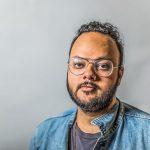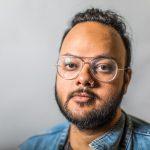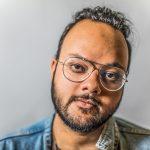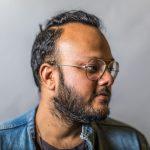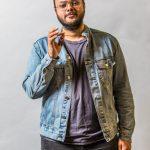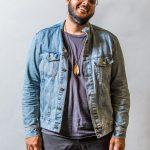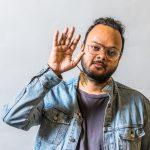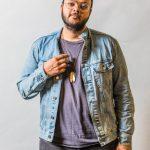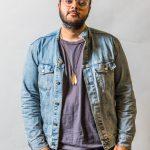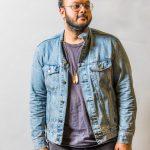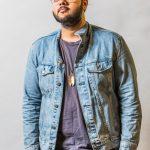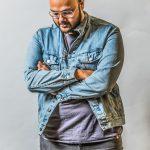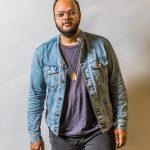The High Key Portrait Series: Raj Haldar of Lushlife and The Skull Eclipses
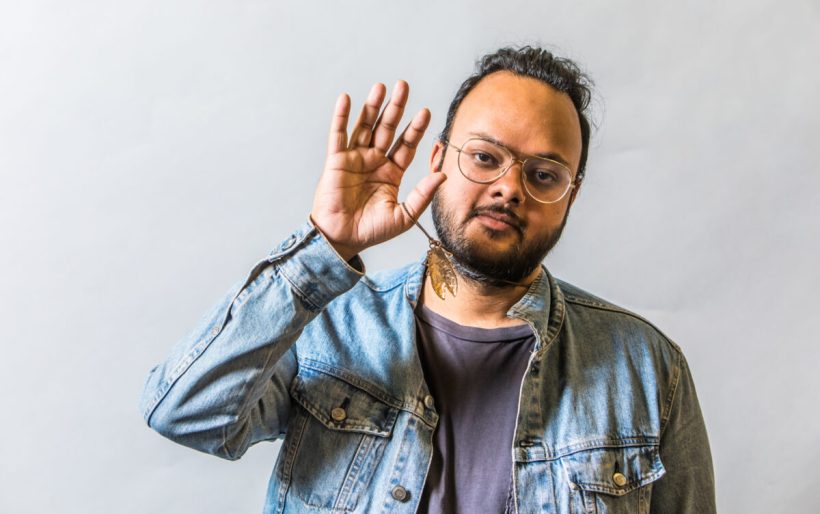
Raj Haldar | photo by Josh Pelta-Heller for WXPN
“High Key” is a series of profiles conceived with the intent to tell the story of Philly’s diverse musical legacy by spotlighting individual artists in portrait photography, as well as with an interview focusing on the artist’s experience living, creating, and performing in this city. “High Key” will be featured in biweekly installments, as the series seeks to spotlight artists both individually and within the context of his or her respective group or artistic collective.
At last September’s Philly Music and Arts Fest, Philly rapper Raj Haldar and Austin-based producer Botany debuted material as The Skull Eclipses. Haldar brought some fire that night, piquing interest for his new project, though to be fair current fans of his other nom de plume Lushlife were already plenty familiar with the level of focused intensity and urgency in Haldar’s lyrical delivery, and all the thoughtfulness with which he crafts a verse.
In the below interview, conducted later that evening, Haldar seemed more than satisfied with their first outing. He was just a bit opaque about this project back then, by necessity, but at the same time you could see him wrestling a bit to keep his exuberance for it pent up. He talked openly about his work as Lushlife, and about what he described as an organic transition from being a recording auteur to now entrusting the beats to the capable hands of a skilled producer. Haldar shared his thoughts on Philly, too, from the perspective of an artist who’s spent significant amounts of his life and recording career in London, New York, and Los Angeles as well, and the unique position to be able to comment on the pros and cons of life both as an aspiring and professional recording artist informed and impacted by those communities.
Prior to their stage premiere at World Cafe last Fall, The Skull Eclipses had issued their first single, “Totality Piece,” featuring Philly native Mary Lattimore on harp, having timed it as a soundtrack for viewing the solar eclipse in August. This year, they’ve lined up international tour dates in support their upcoming record release, including a performance at Johnny Brenda’s on Friday, March 9th. More information can be found here.
THE KEY: Were you born in Philly?
RAJ HALDAR: Nah, grew up in North Jersey. Lived in New York City for a minute, and moved to London for awhile. I was out there touring through my early twenties, and making some of my early shit. I had a record deal, and came back to do my second record. I had already lived in New York, didn’t wanna be there, so I kinda was just like, let’s go to Philly and make a record. And like the moment I touched down in Philadelphia, like the first night, I was like “oh, this is where I wanna be musically.” I felt even just as a human being, it was a city that was really not oppressive, for an artist in their early [years]. You’re not making a lot of money, the cost-of-living here’s great. It just became home, man, I’ve been been here for over a decade now.
TK: How’d you first get connected to the Philly music scene? Do you feel now like you’re a part of that community?
RH: Man, like, just growing up, I mean, I think The Roots’ first embryonic, pre-album record came out when I was in fifth grade, called Organix, before their major-label debut. And I remember I was in London with my family on Summer vacation, went to the HMV on Oxford St., gripped that shit, and literally from the time I was ten, I was an acolyte of Black Thought. Philly just has such a long history in the hip hop world, and like the way I rhyme, and my flow and shit, even before I moved here it was almost just kinda fated to be, because I just took so much from Philly rappers. I loved Schoolly D.
TK: So you kinda gravitated toward that sound. But you were a hip hop fan even before The Roots…
RH: Yeah yeah, late eighties, I was young. But I remember those records. You know, when you have an older sibling, you kinda get into good music early, best case scenario. My brother had good taste; I was into Nas, and the Pixies, and the Smiths, by the time I was 10 and 11 years old. So yeah, Philly rap, and other shit too, man. I was a pre-teen obsessed with music.
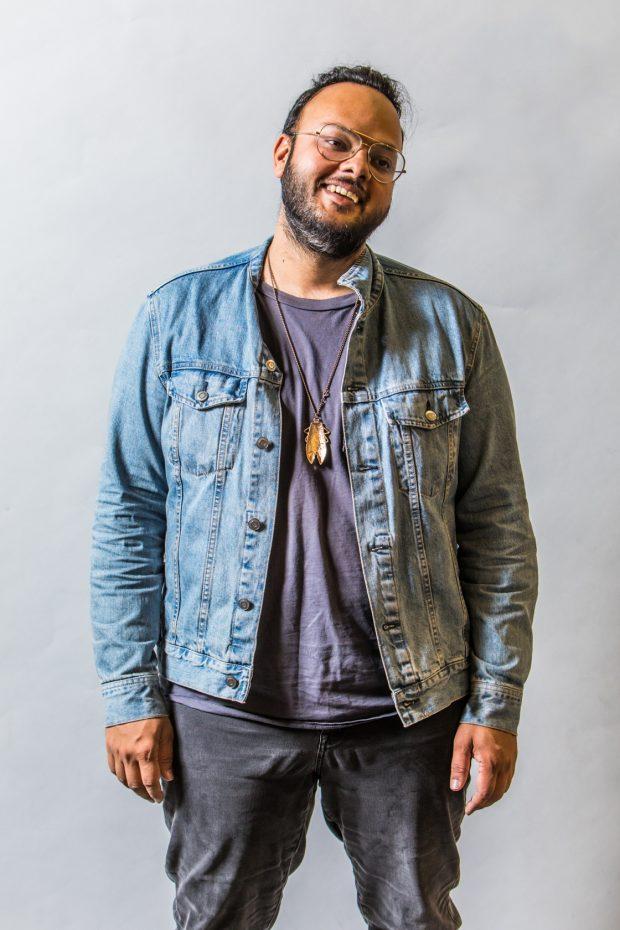
Raj Haldar | photo by Josh Pelta-Heller for WXPN
TK: Your flow seems to me squarely based and informed by hip hop of the ‘90s, which is largely different from mainstream rap today. As an artist, do you feel at all at odds with modern rap?
RH: Nah. I mean, I will say I appreciate Lil’ Uzi Vert and stuff. But like it’s not necessarily my thing, and you’ll never hear Lushlife and Skull Eclipses stuff sorta sound like that, because it’s not my universe. That stuff is for 15-year-olds now. And who am I to say…hip-hop, like any other art form, is always evolving, and it’s pop music, so the stuff that you hear is generally targeted toward young kids. A lotta the trap shit, I dig it. And it kind of informs my music in a surreal sorta way. But it would be disingenuous of me to kinda try to fit in that lane. And what’s great about just the democratization of music and internet culture is that I can reach the people that wanna hear that fucking like psychedelic, weird, like, ‘90s-influenced shit that I do. And so you know, I don’t feel the need to kind of confirm in that way.
TK: What’s different in your words between the body of work you’ve recorded as Lushlife and the forthcoming Skull Eclipses album you recorded with Botany?
RH: Oh man, it’s a different medium. I’ve spent the last decade producing tracks, and doing the whole thing soup-to-nuts, from recording to performing. And you know, sometimes you just gotta like, shake things up, and Botany — my partner in Skull Eclipses — he’s a producer in the sort of Flying-Lotus, L.A.-Beat scene sort of lane (he’s from Austin, though). But, he’s the kind of dude where like, every time he plays me something — just something he might’ve even made in like ten minutes, or it’s something that he’ll just make on-the-fly onstage — I’m like this is better than something I would toil over for like, you know, hours or days.
He is a gifted producer, and has a vision, and does amazing stuff building these tracks onstage. We’ve worked together in the past — he’s produced stuff on Lushlife records here and there — and it was sort of time for just a new sort of foray into something different, and I felt we could combine forces and create what ended up being this Skull Eclipses thing. It’s this sort of amorphous psychedelic-beat-rap shit. We don’t even know what it’s gonna become. Somebody asked me when I got off stage like ‘oh, where can I hear the music?’ Like, bro, there is no music yet! We’re working on stuff, this is the maiden voyage and, you know, it felt good. It felt great, in fact. I think part of it is just, I put out three LP’s as “Lushlife,” and I think this is the next thing that I wanted to do.
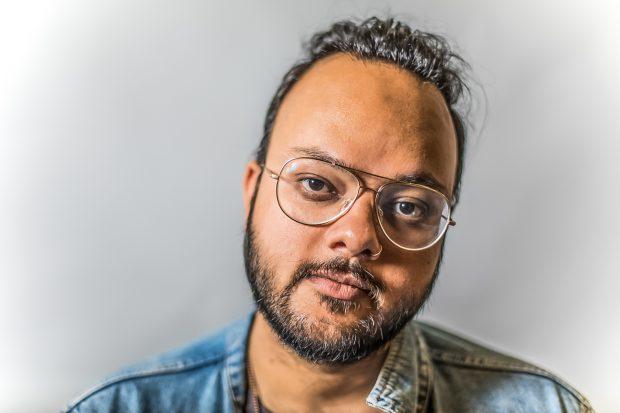
Raj Haldar | photo by Josh Pelta-Heller for WXPN
TK: Thinking back to Philly — which Philly artist or artists influenced you the most?
RH: I mean The Roots I think just stand out in my mind. If you look at what I’ve done as Lushlife, the sort of connection between really hopefully thoughtful production work and then the sort of classic East-Coast flow, but maybe sort of touching on things that, if you’re not listening could just be maybe syncopated fuckin’ ‘90s rap shit, but talking about a lotta esoteric shit, right? I got a lotta that from The Roots, man. But beyond that, as somebody who loves to dig for records, a lotta the Philly-soul stuff, man, Gamble-and-Huff shit. That sound — that maximalist soul/R&B/jazz kind of sound — is for whatever reason man just part of me.
TK: What’s it like when you’re at a national level as an artist from Philly who’s influenced so much by another artist from Philly, do you ever sense any pressure from that?
RH: Damn. On the record, I watch YouTube videos of [Black] Thought — his freestyles are better than my written rhymes, dog! I can’t even feel that pressure, because I think those dudes, like, I bow at the altar. Tariq [Trotter] is a genius on a level that I’ll never achieve. I try to make great music. What was really cool for me, fairly recently — maybe sometime last year — I emailed Black Thought. I was working on a track, I was thinking about getting him on it, and he hit me back and he was like, “I been seein’ you and watching you for a couple years and you’re amazing,” you know? We’re still working out maybe doing something together, hasn’t happened yet, but…
TK: What was that moment like?
RH: Jesus Christ… There are those moments where the people you admire and have molded your career out of give you dap. Like I went on the road with Camp Lo for their 15th-anniversary tour for Uptown Saturday Night. Those guys gave me a lotta love. Camp Lo’s great, they’re like a cult-’90s group, but like to me it meant the goddamned world.
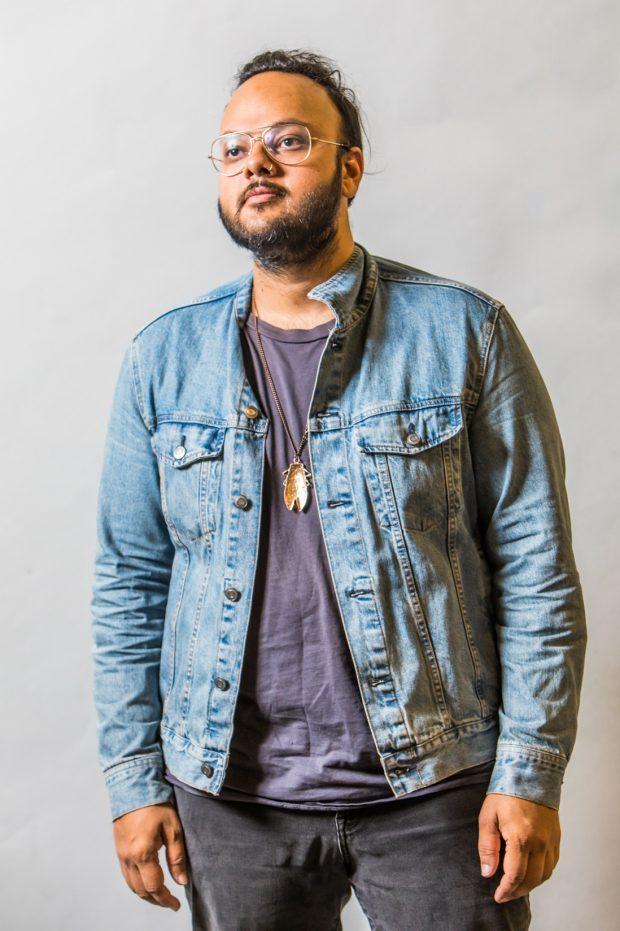
Raj Haldar | photo by Josh Pelta-Heller for WXPN
TK: I ask these questions because sometimes I could see hearing an incredible album and actually feeling inspired to stop making music, like maybe hearing Nick Drake’s guitar and thinking something like ‘well why bother, because nothing I could write would ever sound like that…’ The other side of it though is your perspective, that it would drive you to push yourself to keep creating…
RH: Yeah, I personally don’t perceive art in this sort of way where it’s like, “good/better/best,” necessarily. The creative process itself is like a kind of godly thing to me. It’s like, just the act of doing is the thing. I’m not necessarily competitive — I feel like I make good shit, [laughs] but — I’m not pining away if it’s not meeting some level. What I do wanna do is create something that doesn’t exist in the canon. And that’s where I think I sort of hopefully do shine. I think I have this unique life experience where I was really deeply entrenched in ‘90s alternative rock, and very entrenched in a very fuckin’ real way in New York hip hop, Philly hip hop, Jersey hip hop.
I think if nothing else, what I want to have to done and what I continue to do is bring the sounds of classic hip hop, avant-garde music, indie music together in a way that doesn’t seem contrived, and also is a very real amalgamation of those things. And when I think about all of my LP releases, I do feel like there’s nothing I’m not proud of in sort of bringing those ideas forward. Sometimes I think when people try to meld genres together, especially with hip hop, it doesn’t feel like hip hop anymore, but I think when I look back on my records, they sort of push boundaries, but they always feel like rap records.
TK: It’s interesting to hear you mention not being competitive, because hip hop does have that component of “battling,” and a culture of lyrics that express that.
RH: Yo, I am a terrible freestyler, dog. [laughs] I mean I’ve had some good moments in the show. Y’know, but, that is not my forte. And it’s like this thing: there’s battle-rappers, and then there’s writers. Like Nas is a writer — no shots to Nas! — but I’ve heard like on the Stretch & Bobbito show he used to freestyle and [you’d think] hmm, this is not that good… But like, he’s my favorite emcee, right? He’s a writer. I’m somebody who sits down and plays the beat over and over and over again for hours and hours and hours and really sculpts the sound of the rhymes. I’m not a battle-rapper. And like there is something inherently competitive about rap, and there’s the bravado and all that. And you know, I maintain that swag, but I’m just not necessarily trying to be better than anybody. I’m just trying to be my own lane.
TK: I think that craftsmanship is evident. What do you remember from your first show in Philly?
RH: Oh, shit. King Britt — another dude [that was an influence from Philly], I was also really into house music in high school, King Britt, Sylk 130 and shit. So when I touched down here to work on my record, King was one of the first people to reach out to me, embrace me and shit. Which was fantastic. He put my on for my first show in Philly, at Silk City. And there was four other acts, all on that small stage. And I roll up with like a laptop setup, maybe a turntable or something. There’s not a lot of room on the stage. Last person to set up. And I start going — and mind you, this is in front of pretty much close to an idol — and I start the first track, and then 45 seconds later, my laptop just comes crashing off the stage. Like the screen breaks. Music stops, screen breaks, there’s no going back. I was 25, 26. And I proved something to myself that day! I kicked a freestyle for like a minute and a half — not off-the-top but like, kicked a rap, a capella — and the crowd had so much love for that whole scenario. It was like my fuckin’ laptop with all my beats on it and shit, inside I was like what the fuck. But I tried to kinda give them something, and the audience fuckin’ embraced me. And for a first show in Philly — although it was hella stressful — in terms of the scene and the people and like caring about each other and putting each other up, it’s kinda emblematic of all that.
TK: Did you recover all the stuff on there?
RH: Oh man, I’m sure I did. The hard drive probably wasn’t fucked and I got my shit off. But when you’re standing on stage like, oh, I didn’t back any of that up!, and I have a fuckin’ cracked screen, and I’m 26 and broke and whatever. It’s a shitty moment, but, glad to be outta those weeds.
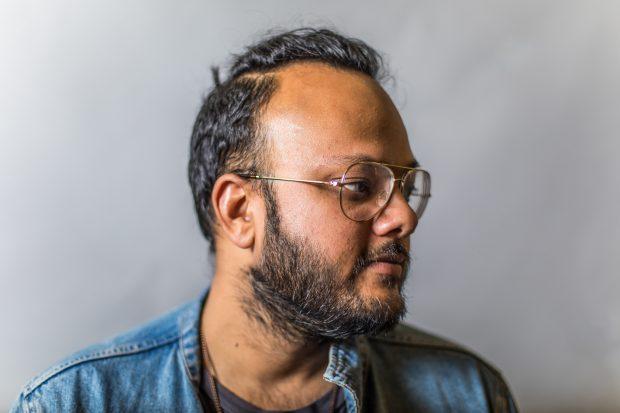
Raj Haldar | photo by Josh Pelta-Heller for WXPN
TK: What do you think is the best thing about being part of the Philly music scene, and conversely what’s the most frustrating part about trying to create in Philly?
RH: I think Philly — as opposed to these almost impossibly enormous world cities like London, New York, those are the other two places where I lived as an adult — the thing that I love about Philly is that it is a provincial sort of city. It’s you know, in between DC and New York. But that to me, I connect with people. I’m not just some island lost in some millions and millions of people, making music. And the thing is, [Philly’s] not a small town, it’s got an international footprint, in its own way. So it’s like the best of both worlds. I love working with Philly artists across the board. I mean there’s a lot of session musicians and shit that play on my records, but like also working with Freeway and stuff. I don’t know what I’d do without this city. That’s the fucking core point, to me, this city means the world to me.
TK: Any frustrations with it at all?
RH: Mm. Yeah, I mean, and that’s why I spend a lot of my time between New York and LA. Because, you know, I’m doing a lot more music for film and television, and that stuff is happening in LA and New York. And so just from a functional standpoint, this city…I mean the thing that makes it great is that isn’t isn’t like some big media center or whatever, but at the same time the downside to that is that I end up having to be traveling a lot. The opportunities…when I’m in LA, it’s like, you’ll like fuckin’ hang out with a friend of a friend and they’re like “oh do you wanna score this?,” or something — that doesn’t happen to me, in Philly. And that’s a downside, but the thing that keeps me here is the lifestyle, the musicians, the fact that your average musician can support themselves here. I don’t wanna be broke-in-Brooklyn, and I don’t wanna be around people that are broke-in-Brooklyn. Like please don’t tell all those Brooklynites about Philly.
TK: So if I could try to sum that up, you feel more capable of creating here and sustaining yourself here, but more opportunity in other places.
RH: Yeah. And so what I end up doing is making Philly my consistent home-base, and you know, I spend 2-3 weeks a month in New York and LA.
- Raj Haldar | photo by Josh Pelta-Heller for WXPN
- Raj Haldar | photo by Josh Pelta-Heller for WXPN
- Raj Haldar | photo by Josh Pelta-Heller for WXPN
- Raj Haldar | photo by Josh Pelta-Heller for WXPN
- Raj Haldar | photo by Josh Pelta-Heller for WXPN
- Raj Haldar | photo by Josh Pelta-Heller for WXPN
- Raj Haldar | photo by Josh Pelta-Heller for WXPN
- Raj Haldar | photo by Josh Pelta-Heller for WXPN
- Raj Haldar | photo by Josh Pelta-Heller for WXPN
- Raj Haldar | photo by Josh Pelta-Heller for WXPN
- Raj Haldar | photo by Josh Pelta-Heller for WXPN
- Raj Haldar | photo by Josh Pelta-Heller for WXPN
- Raj Haldar | photo by Josh Pelta-Heller for WXPN
